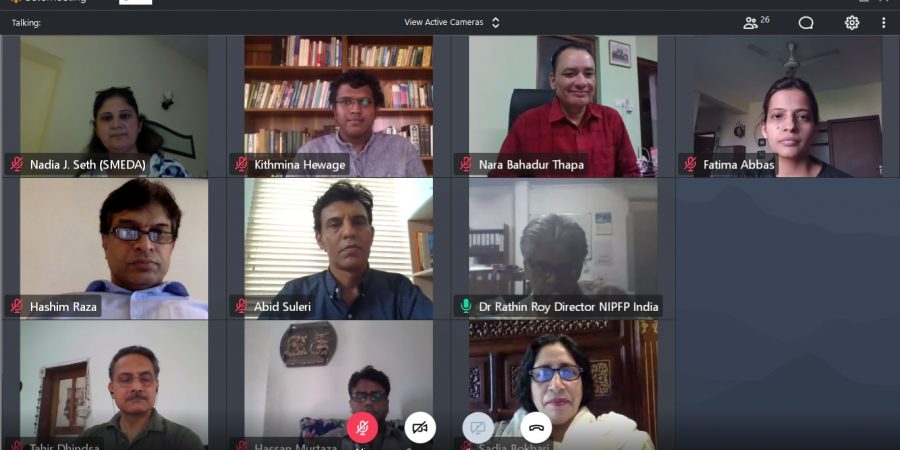Experts highlight need to bailout SMEs

ISLAMABAD: (DNA)
Experts across South Asia highlighted the importance of Small and Medium Enterprises (SMEs) for their economies and emphasized the need to bailout SMEs amid covid19. Terming identifying the SMEs and workers working in informal sector as a major challenge, the experts suggested to have a South Asia network on SMEs.
The experts from the SAARC region including Pakistan, India, Sri Lanka and Nepal shared these views with the audience at online policy dialogue titled ‘keeping SMEs in Business in South Asia: Policy Responses, Lessons and Proposals’ organized by the Sustainable Development Policy Institute (SDPI) here on Thursday.
Dr Aliya H Khan, Member Economic Advisory Council (EAC), while highlighting the specific impacts of Covid-19 on the daily wagers and other low income groups, said that the Prime Minister Imran Khan may announce the ‘Mazdoor Ehsaas Program’ on labour day (May 1st 2020) and it expected to alleviate the problems faced by this segment of society.
She said that protection of SMEs is also important from gender perspective as majority of the home-based work force comprises of women, who are already marginalized and the pandemic has enhanced their existing economic vulnerabilities.
Dr Abid Qaiyum Suleri, Executive Director SDPI, said that SMEs are important for South Asian economies not only due to their share in GDP, but also because they are the second largest employer after agriculture. “All SAARC countries are facing similar challenges of supporting SMEs amid COVID19, we need to learn from each other and this is where the idea of creating a South Asia Network of SMEs is very much needed”, Said Dr Abid Suleri
Dr Rathin Roy, Director, National Institute of Public Finance and Policy (NIPFP), India, said that the SMEs in all the South Asian countries including India are facing similar kinds of issues due to global pandemic. He says while the Government in India is taking several measures to support SMEs, new approaches are required to deal with the situation such as locally focused supply chains.
Mr Kithmina Hewage, Research Economist at Institute of Policy Studies (IPS), Sri Lanka, said that SMEs in Sri Lanka have born the heaviest brunt of the current crisis. He said that the short terms relief package to SMEs has been absolutely necessary. However, going forward, we need to have a long term policy to support SMEs. This would help I econimc recovery post COVID19.
Mr. Nar Bahadur Thapa, former director of the Nepal Rastra Bank (Central Bank of Nepal), said that the SMEs in the post-Covid-19 situation should work on the diversification of their products and e-commerce could alone be a key areas of focus. He said the Government in Nepal, realizing the problems being faced by SMEs, is considering to incorporate long term monetary policies and incentives in the forthcoming annual budget. He also highlighted the importance of having a SAARC network of SMEs.
Mr Hashim Raza, Chief Executive Officer Small & Medium Enterprises Development Authority (SMEDA) said that the Government of Pakistan fully understand the contributions of SMEs in the national economy and is trying to support the sector through various measures including soft loans to retain the permanent employs and work on restarting their business when the pandemic is over, and social protection for the workers. He advised the SME sector to make the best of the situation, diversify the traditional export market and come up with innovative ways to absorb the laid off labour when times get better.
Hassan Daud Butt, Chairman KP BOI, said that Khyber Pakhtunkhwa government was trying to keep agriculture supply and demand chain unaffected, and protect the service sector. “Good news is that due to govt’s support more and more female entrepreneurs in KP are coming up in telemedicine and ecommerce”, added Mr Butt.
The experts, in response to queries raised by the audience, said amidst the fear of a deep and prolonged recession, innovative ways would have to be explored in order to ensure that SMEs are staying in the business in the post Covide-19 scenario. The experts said that although the governments in South Asia are coming up with short term relief packages to SMEs, innovative measures including enhancing the regional trade would be need of the hour.
Related News

FPCCI opens Pakistan-EU business forum membership for 2026
KARACHI, FEB 4: /DNA/ – Atif Ikram Sheikh, President FPCCI, has announced that the Pakistan-EURead More

PM’s relief package to strengthen export base: ICCI President
Applauds FBR for rationalizing Islamabad Property Valuation ISLAMABAD, FEB 3 /DNA/ – The Islamabad ChamberRead More


Comments are Closed